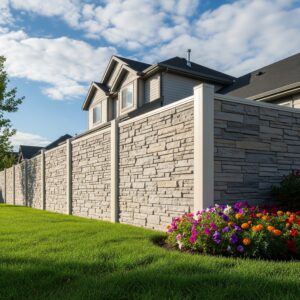When it comes to erecting a fence, the choice of material is more than just a practical decision; it’s an aesthetic and economic one as well. The right fencing material can enhance the beauty of a property, provide security, and even increase property value. But with so many options available, how does one choose the right one? The three most popular materials for fencing are wood, metal, and vinyl, each with its unique set of characteristics and benefits.
- Wood: A traditional favorite, wood offers natural beauty and a classic look. Its versatility allows it to fit various design preferences.
- Metal: Known for its strength and durability, metal fencing, including wrought iron, steel, and aluminum, offers both security and elegance.
- Vinyl: A modern alternative, vinyl fencing is low maintenance, resistant to weathering, and available in various styles and colors.
Each material brings something different to the table, and understanding these differences is crucial for making an informed decision that aligns with personal needs, aesthetic preferences, and environmental conditions.
The Timeless Charm of Wooden Fences
The allure of wooden fences has stood the test of time, largely due to their natural aesthetic appeal. Wood, as a material, possesses an innate warmth and classic elegance that can’t be replicated by synthetic materials. This charm is why wooden fences are a perennial favorite among homeowners. Whether stained to showcase its natural grain or painted in a color that complements the house and landscape, wood can be customized to suit a variety of tastes and styles.
Wood’s ability to integrate seamlessly into diverse landscapes is another reason for its popularity. It complements both rustic, country settings and more modern, urban environments. A wooden fence can be as unobtrusive or as prominent as desired, blending into the background or serving as a focal point in garden design. The versatility of wood, combined with its aesthetic appeal, makes it a material that resonates with many, providing both functionality and a touch of nature’s charm to any property.
Top Contenders: Best Woods for Fencing
Choosing the right wood for your fence is crucial for both its appearance and longevity. Among the various options, three types stand out: Cedar, Redwood, and Pressure-Treated Pine.
- Cedar: The All-Rounder Cedar is highly prized for fencing due to its natural resistance to rot and insects, making it a durable and long-lasting choice. This wood type requires less maintenance compared to others, helping to save on long-term upkeep costs. In addition to its practical advantages, cedar is renowned for its aesthetic appeal. Its warm tones and pleasing natural grain bring a rustic yet refined look to any property.
- Redwood: The Luxurious Choice Redwood is often chosen for its superior longevity and resistance to decay. Its natural oils provide an intrinsic defense against the elements and pests, making it an exceptionally durable choice for fencing. Beyond its resilience, redwood is celebrated for its rich color and deep grain texture, adding a touch of luxury and elegance to the landscape. However, this luxury comes at a higher price, making redwood a premium choice.
- Pressure-Treated Pine: The Economical Workhorse For those on a budget, pressure-treated pine is an ideal option. It is not only affordable and widely available but also boasts enhanced durability thanks to its chemical treatment process. This treatment helps the wood resist rot, decay, and insect infestation, significantly extending its lifespan compared to untreated wood. While it may not have the natural beauty of cedar or redwood, its cost-effectiveness and durability make it a practical choice for many homeowners.
The Backbone of Your Fence: Choosing the Right Fence Posts
The integrity of a fence is only as strong as its posts. Therefore, selecting the right material for fence posts is as important as choosing the fencing material.
- Importance of Sturdy and Durable Posts Fence posts bear the structural load of the fence, making their durability and strength paramount. They need to withstand various stresses, including weather changes, soil conditions, and physical impacts.
- Comparing Wood Types for Posts When it comes to posts, the same types of wood used for fencing panels are generally considered. Cedar and redwood offer natural resistance to rot and decay, making them strong candidates. However, for more cost-effective solutions, many opt for pressure-treated pine, which, though less aesthetically pleasing, provides the necessary durability at a lower cost.
- Longevity and Maintenance Considerations The lifespan of fence posts depends significantly on the type of wood and maintenance. Cedar and redwood posts may last longer with minimal maintenance due to their natural properties. In contrast, pressure-treated pine might require more upkeep over time but is initially more affordable. Ultimately, the choice of wood for fence posts should balance durability, maintenance requirements, and budget.
Beyond Wood: Exploring Alternative Fencing Materials
While wood remains a popular choice for fencing, there are several alternative materials that offer unique benefits and aesthetics. Two notable options are metal and vinyl fencing.
- Metal Fencing: Strength and Elegance Metal fences, including varieties like wrought iron, aluminum, and steel, offer a blend of strength and elegance. Wrought iron is celebrated for its classic, intricate designs and robustness, making it ideal for those seeking a combination of security and aesthetic appeal. Aluminum fencing provides a rust-resistant and low-maintenance option, suitable for areas with harsh weather conditions. Steel, known for its strength, is often used in commercial settings for its durability. These metal options are generally more durable than wood and require less maintenance, though they can be more expensive.
- Vinyl Fencing: The Modern Twist Vinyl fencing represents a modern alternative to traditional fencing materials. Its primary advantage lies in its low maintenance requirements; it does not need painting or staining and is easy to clean. Vinyl fences come in a variety of styles and colors, allowing for customization to suit different tastes. Furthermore, they are resistant to weather conditions, insects, and rot, contributing to their longevity. Vinyl fencing is a good choice for those looking for a durable, low-maintenance option with a modern appearance.
Making the Right Choice for Your Needs
Selecting the perfect fencing material for your property involves considering several key factors:
- Factors to Consider
- Climate: The local climate plays a significant role in your choice. Materials like vinyl and metal might be more suitable in areas with harsh weather conditions, while wood could be ideal in more temperate climates.
- Budget: Your budget is a crucial factor. While metal and vinyl might have higher upfront costs, their lower maintenance requirements can be more cost-effective in the long run. Wood, on the other hand, is generally more affordable initially but may require more maintenance.
- Maintenance: Consider how much time and effort you’re willing to invest in upkeep. Wood fences require regular maintenance, whereas vinyl and metal options offer ease with minimal upkeep.
- Personalizing Your Fence Choice Finally, consider the aesthetic and functional needs of your property. A fence should complement the style of your home and landscape. For example, a wrought iron fence might suit a historic or elegant home, while a wooden fence could be more fitting for a traditional or rustic setting. The purpose of the fence—whether for privacy, security, or decorative appeal—should also guide your decision.
In conclusion, the choice of fencing material is a balance of practical, aesthetic, and budgetary considerations. By carefully evaluating these factors, you can select a fence that not only meets your needs but also enhances the overall appeal of your property.



